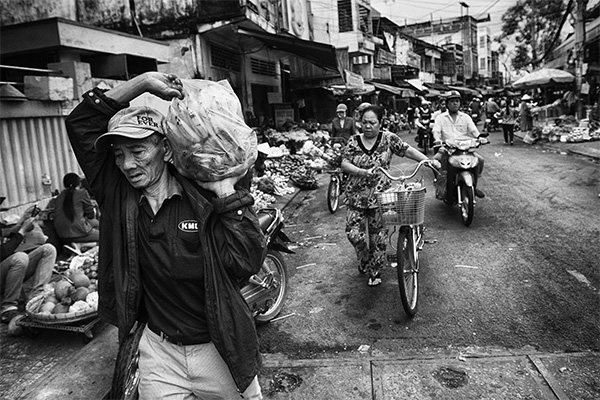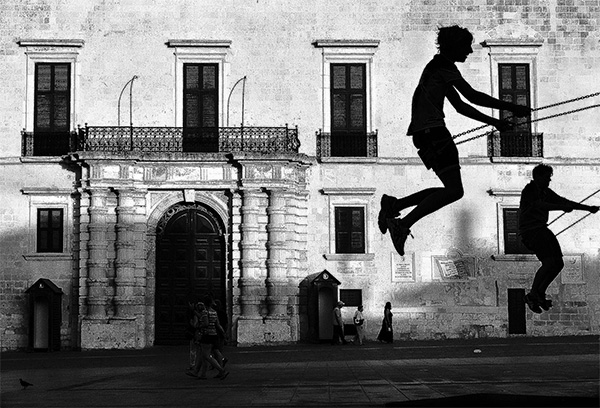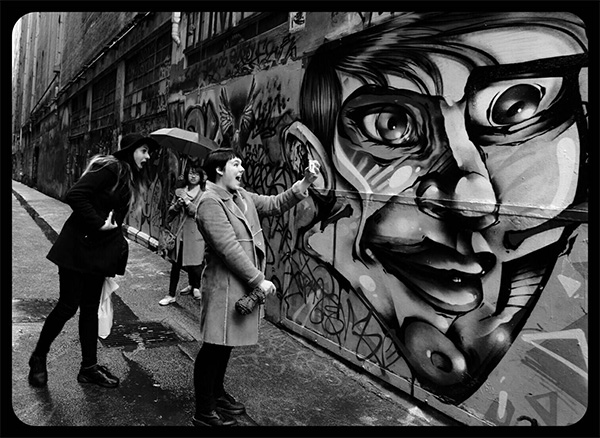What lens features should be important to the B&W street photographer?
Lens Features for B&W Street Photography
By Kaitlyn Luckow

Photograph by Luca Fecarotta, GuruShots Master, Urban Scenery Challenge
Street photography, like wildlife, nature, and landscape photography, has become a solo niche for amateur and professional photographers. For the street photographer, subject matter is just an elevator or flight of stairs away, heading into the streets outside your apartment to document the city around you. This can be a lot of fun, and a great way to escape the stress of daily life. So, how does a street photographer with a DSLR choose the right lens?
For the photographer who enjoys shooting on the streets of a city, the choice of lens is as important as it is in wildlife or nature photography, but for different reasons. A natural vista may wait for you to frame and capture the perfect shot, but life in the city is always moving. If you don’t get the shot right on the first snap, chances are you have missed a moment that you will never be able to capture again. For this reason, having the right lens with the proper features for capturing street images is very important.
Styles of Street Photography
There are many different styles of street photography, and one important key to choosing the right lens is to determine what style of street photography interests you most. Some street photographers prefer to choose a single spot, and capture images of people moving through their frame. Others prefer to move around, shooting anything around or approaching. Other still prefer to capture subjects from a distance while moving around the city.

Photograph by Silvano Mangiafico, a GuruShots Guru, City Streets Challenge
There isn’t a right or wrong approach to street photography, but clearly the style you choose will affect your lens choices, because each style calls for a different lens type. You’ll also want to be sure to account for gear you will be carrying with you on the streets, so lugging around a heavy bag full of gear isn’t going to be an ideal method. For these reasons, primes tend to work best, and choosing a focal length that works for your vision will be crucial. Most street photographers who like to be close to their subjects and are more interested in composition than in depth will prefer a 35mm focal length, while street photographers who wish to capture distance and depth use a 50mm focal length. And of course there are those who stick with the classic, going for black and white photography.
Focusing Style: Manual or Auto
For many street photographers, manual focus has traditionally been the way to go, so lenses with strong manual focus functionality, excellent grip, and focus aids like distance scales will serve any street photographer well. Look out for lenses offering focus-by-wire systems, as these systems, while fairly smooth and effective for auto-focus, tend to be less so with manual focus. Still, newer lenses and cameras have greatly improved autofocusing systems, including some lenses with very fast autofocus capability that some up-and-coming street photographers seem to be utilizing. For this reason, knowing what sort of focus system your chosen street photography lens has will be an important factor in making the decision to invest in a particular lens, or family of lenses.

Photograph by John Spry, a GuruShots Advanced Member, Street Culture Challenge
Weather Sealing for Street Photography
Unless you’re fortunate enough to live in a paradise where the weather is always perfectly warm and dry, weather is a factor that must be considered with any sort of outdoor photography. Being outside and exposed to the elements without a weather sealed lens will risk your gear, and the cash that you have invested in it.
If you’re considering two lenses that suit your needs, and one has weather sealing, choose that one. That being said, if you choose to pick up a lens without weather sealing on its other merits, and there are plenty of good reasons to do so, accessories like rain covers can help to protect your gear. Weather sealing is the best option for protection from the elements, and while it isn’t absolutely essential, it does eliminate the need to carry the additional weatherproofing gear for a photography trip.
Time of Day, Lens Flares, and Other Considerations
In any kind of outdoor photography, lighting changes constantly, and it is seldom more dynamic than in street photography. The aperture size of a lens determines the minimum shutter speed required to capture an image – larger apertures allow in more light, and so they tend to be called “faster.” If you’re taking photos primarily during the day, you can choose a slower lens, which is usually more affordable. There is plenty of light during the day, so you don’t need a large aperture. However, for taking photos late in the day or during the night, like the vintage images in this Flaskaholic article, you’ll want to allow as much light into the camera as possible, so larger apertures on faster lenses will be important for you.
Another consideration for street photography are lens flares. In a city street, a photographer has very little to no control over the lighting conditions. As a result, light could hit your camera from odd angles, causing flares. Certain lenses are more forgiving of flare than others, and some photographers find that flares can help enhance the creative direction of their images. For example, fixed focal length lenses tend to be more prone to flare than zoom lenses are, and wide-angle lenses tend to be very resistant to flares from light sources. In addition, many modern lenses have anti-reflective coating to reduce flare, but if you’d like to incorporate lens flare effects in your photos, some older lenses by Leica and Hasselblad have no anti-reflective coating at all, and can produce significant flares even in low light. On the other hand, if you are getting flares and you’d rather not, a lens hood can help prevent them. Consider how your lens works with flares, by experimenting if you need to, and you you feel about them, before you make a final decision.
Please Support Neocamera
All information on Neocamera is provided free of charge yet running this website is a huge endeavor. Purchases made via affiliate links found throughout the site help keep it running and up-to-date. There is no additional cost to you, so please consider buying via these links to our affilates:
Thank you for your support!
Updates
2025.11.13

Best Gifts for Photographers in 2025 by Budget
The annual Neocamera Photography Gift Guide updated to 2025. Find great gifts for photographers with any price budget.
2025.07.07

Stellar Photo Recovery Review
Review of Stellar Photo Recovery V12. This Windows and MacOS software can recover photos and videos in a huge number of formats from memory cards, USB drives, SSDs and HHDs.
2025.05.14

Huion Kamvas 13 Gen 3 Review
In-Depth review of the Huion Kamvas 13 Gen 3 Pen Display Tablet for photographers and graphic artists.
2025.01.18

Fujifilm GFX 2025 Lens Roundup
Lens Review roundup of Fujifilm GFX Medium-Format lenses. Quality, performance and handling of the GF20-35mm F/4R WR, GF30mm F/3.5 Tilt-Shift and the GF55mm F/1.7.
2024.11.18

Best 2024 Photography Gifts for Every Budget
Great gifts for photographers and photo enthusiasts selected for every budget among the best products of 2024.
2024.08.07

Eye Protection Tips for Professional Photographers
The four main considerations for professional photographers regarding eyewear.
2024.07.14

Fujifilm X100VI Review
Flagship fixed-lens compact digital camera with a 40 MP sensor and Image-Stabilization, a first for the series. Retro design featuring dual control-dials, plus direct ISO, Shutter-Speed and EC dials. Its hybrid viewfinder can switch between EVF and OVF mode.
2024.05.09

Fujifilm GFX100 II Review
Flagship 102 Megapixels Medium-Format Mirrorless Digital Camera with 8-Stop 5-Axis IBIS, 8 FPS Drive, 8K Video and 400 MP Super-Resolution capture in a weatherproof and freezeproof body with dual control-dials and dual memory-card slots.
2024.04.03

Fujifilm X-T5 Review
Newest Fujifilm flagship boasting a 40 MP APS-C sensor, 5-axis IBIS with 7-stop efficiency, 15 FPS continuous drive, 6.2K Video capture, dual control-dials and dual SDXC UHS-II slots in a sturdy weatherproof and freezeproof body.
2023.11.20

Best Digital Cameras of 2023
Find out which are the Best Digital Cameras of 2023. All the new Mirrorless Digital Cameras from entry-level to high-end professional.
2023.07.10

Fujifilm X-H2 Review
40 Megapixels APS-C Hybrid Mirrorless Digital Camera with 7-stop IBIS. Fastest shutter ever and 8K video capture. Large builtin EVF with 0.8X magnification and 5.8 MP, plus an Eye-Start Sensor. Packed with features and large number of controls in a weatherproof and freezeproof body.
2023.05.07

Sony FE 20-70mm F/4G Review
Review of the unique Sony FE 20-70mm F/4G lens. The optical zoom of this lens spans ultra-wide-angle and medium focal-length coverage, making it one of the most versatile Full-Frame lenses on the market.
2025.11.13
2025.07.07
2025.05.14
2025.01.18
2024.11.18
2024.08.07
2024.07.14
2024.05.09
2024.04.03
2023.11.20
2023.07.10
2023.05.07
NEWS
2025.12.02

Sony Upgrades Alpha 7 to 5th Generation
Digital Camera ○ Lens
2025.11.29

Venus Optics Releases New Zero-D Tilt-Shift Macro Lens
Lens
2025.11.23

Best Digital Cameras of 2025
Digital Camera
2025.11.14

Photography Gift Guide 2025 Edition
2025.11.06

Canon Announces Third-Generation R6 Mirrorless
Digital Camera ○ Lens
2025.10.23

Fujifilm Launches X-T30 III Plus New Wide Zoom
Digital Camera ○ Lens
2025.10.21

Peak Design Unveils Field Plate and Form Straps
2025.10.16

Nikon Unveils Z-Mount DX Lens Duo
Lens
2025.10.16

Venus Optics Unveils Fast Telephoto Prime Lens
Lens
2025.10.01

Think Tank Photo FocusPoint RollTop Backpacks
Bag
2025.09.30

Sony Produces Super Macro GMaster Lens
Lens
2025.09.17

Venus Optics Created First Telephoto Ultra-Macro Lens
Lens






